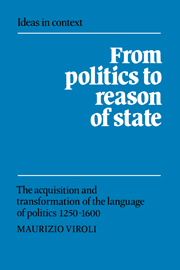 From Politics to Reason of State
From Politics to Reason of State Book contents
- Frontmatter
- Contents
- Acknowledgements
- Dedication
- Introduction
- 1 The acquisition of the language of politics
- 2 The philosophy of the city and the political man
- 3 Machiavelli and the republican concept of politics
- 4 Francesco Guicciardini: between politics and art of the state
- 5 The last glimmerings of civil philosophy
- 6 The triumph of reason of state
- Epilogue. Politics as civil philosophy
- Bibliography
- Index
- IDEAS IN CONTEXT
2 - The philosophy of the city and the political man
Published online by Cambridge University Press: 02 February 2010
- Frontmatter
- Contents
- Acknowledgements
- Dedication
- Introduction
- 1 The acquisition of the language of politics
- 2 The philosophy of the city and the political man
- 3 Machiavelli and the republican concept of politics
- 4 Francesco Guicciardini: between politics and art of the state
- 5 The last glimmerings of civil philosophy
- 6 The triumph of reason of state
- Epilogue. Politics as civil philosophy
- Bibliography
- Index
- IDEAS IN CONTEXT
Summary
The history of the acquisition of the idea of politics reached its turning point in the works of the Civic Humanists. Drawing on the traditions that conjoined in the reconstruction of the language of politics (the doctrine of political virtues, civil law and Aristotelianism), the civic Humanists of the Quattrocento completed the elaboration of the idea of politics as civil philosophy. It was politics' highest moment of glory: not only did it possess its own coherent language, it was also recognized as the most excellent human endeavor.
The celebration of politics as the art of the republic went hand in hand with the rejection of the art of the state, a base art of attaining power and using public institutions for private purposes. Politics and the art of the state were regarded by the Quattrocento humanists as terms of antithesis, just as the “man of state” was the corrupted and degenerated counterpart of the good citizen. Whereas the “civil man” devoted to the common good was pointed to as the highest ideal, the statesman who is prepared to commit any sort of wicked action to attain power, and is glad to serve the powerful in order to dominate his fellow-citizens, was scorned as the most depraved of men.
One of the earliest portraits of the Humanist political man may be found in Petrarch himself, in the second half of the Trecento. In his account of the ideal rector reipublicae the spiritual father of Italian Humanism resorted to the language of political virtues, Aristotelism and civil law.
- Type
- Chapter
- Information
- From Politics to Reason of StateThe Acquisition and Transformation of the Language of Politics 1250–1600, pp. 71 - 125Publisher: Cambridge University PressPrint publication year: 1992
